Nearly A Dozen Afghan Youths Killed By Iranian Border Guards
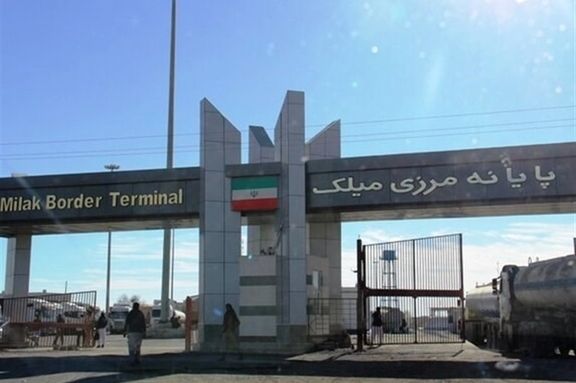
Iranian border guards have reportedly killed at least 11 Afghan citizens including three minors who had illegally crossed into the southeastern Sistan-Baluchestan province.

Iranian border guards have reportedly killed at least 11 Afghan citizens including three minors who had illegally crossed into the southeastern Sistan-Baluchestan province.
According to Afghanistan International, the bodies of the Afghan citizens, who were gunned down earlier this week, have been handed over to Taliban forces at Nimroz border crossing on Wednesday.
According to informed sources, these people were planning to enter Iran illegally on Saturday when the Iranian border guards opened fire on them.
Afghan news websites say those killed were all young Afghans from the southwestern Nimroz province.
So far, neither Taliban officials nor the Islamic Republic officials have commented on the tragic event.
In the past 11 months, the bodies of 470 Afghan immigrants, who were killed for various reasons, especially traffic accidents, have been transferred to Afghanistan.
After the Taliban's takeover of Afghanistan in 2021 and the spread of poverty and unemployment in the country, a large number of Afghans have migrated to Iran and Pakistan. Fear of Taliban reprisals and violence also prompt many people to flee.
Iranian border guards have beefed up their control on the long border with Afghanistan to prevent the influx of migrants.
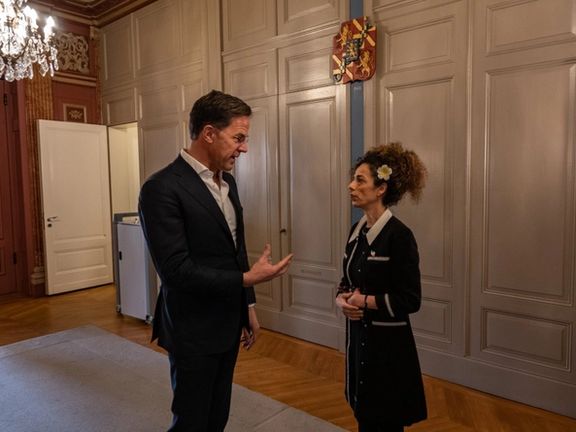
Well-known Iranian-American civil activist Masih Alinejad has urged the Dutch prime minister to designate the Islamic Revolutionary Guard Corps (IRGC) as a terrorist organization.
Alinejad said in a tweet on Thursday that she urged Mark Rutte during their meeting to isolate the Islamic Republic and instead of meeting with regime officials, meet with the coalition of opposition forces.
“We the people of Iran deserve to have a secular democracy like the one you have in Netherlands. Our demand is simple: democratic countries should support pro-democracy movements instead of trading with our killers,” added Alinejad.
She went on to say that she informed Prime Minister Rutte of the torture and rape of minors in the prisons of Islamic Republic.
In another tweet she stated, “I hope all democratic leaders support the pro-democracy movements. A secular democratic Iran will make the world a much safer place. We have to stop the Islamic republic from raping, torturing and killing teenagers for demanding Freedom.”
In response, the Dutch prime minister told Alinejad that many countries in the EU are in favor of sanctioning IRGC and that he is working on the matter.
Despite the adoption of a resolution in the European Parliament to designate the IRGC as a terrorist group. The Revolutionary Guard, which is a military and intelligence force, playing the main role in suppressing Iranians, is not still recognized by the European Union as a terrorist group. The United States designated the group as a Foreign Terrorist Organization in 2019.
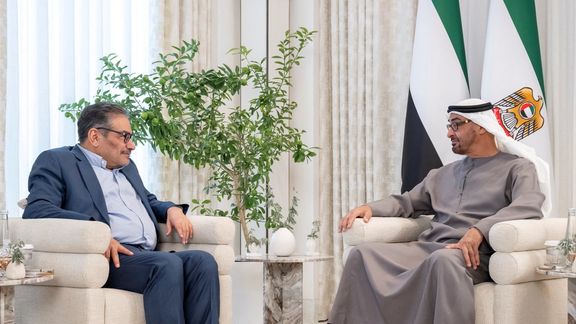
Iranian media appear to be upbeat about the possibility of further breakthroughs in Iran's relations with its Arab neighbors around the Persian Gulf.
Reformist daily Shargh wrote in a commentary headlined, "A season to end disputes" that reports have been coming in since mid-day March 10 when China brokered a deal between Tehran and Riyadh to resume diplomatic ties.
An Iranian parliamentary delegation met with Bahraini counterparts in Manama on Saturday, and Iranian Security Chief Ali Shamkhani visited the United Arab Emirates on Thursday. Manama severed its ties with Tehran one day after Saudi Arabia cut its diplomatic relations in 2016.
Russian sources observed that while the deal with Saudi Arabia was brokered by China as mediator, attempts to improve ties with Bahrain and the UAE are being made through bilateral negotiations.
Officials in Bahrain have attached high importance to restoring ties with Tehran which are likely to start by resuming flights between Tehran and Manama, Shargh newspaper in Tehran wrote. It quoted Iranian West Asia watcher Hossein Amiri as saying that "Saudi satellite countries" including Libya, Maldives, Egypt and Jordan might follow suit soon. The expert told Shargh that the moves signal a new chapter in Iran's foreign policy which is now focused on regional détente.
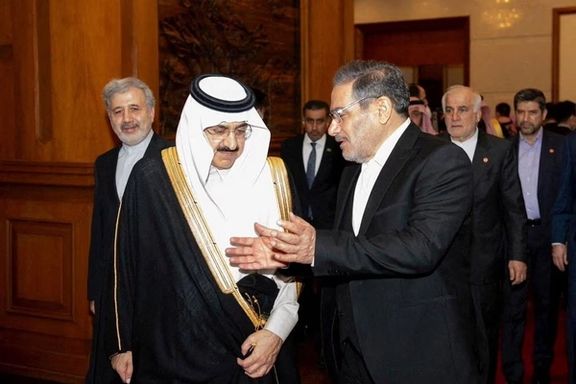
Shargh also noted that an end to the war in Yemen is the beginning of an end to conflicts and tension in the region. In two weeks’ time, everyone in the region will remember the 9th anniversary of the war in Yemen. Iranian diplomat Ali Asghar Khaji told a visiting UN official in Tehran earlier this week that the Islamic Republic has always said that there is no military solution to the conflict in Yemen.
Mohammad Saleh Sadri, another expert on regional affairs, told Shargh that although all previous efforts to end the conflict in Yemen have failed, the agreement between Tehran and Riyadh has changed the situation. Nonetheless, he added that ending the war is no easy task.
Meanwhile, Arab media in London have pointed out that Egypt might be the first country outside the Persian Gulf region to begin to mend its ties with Tehran.
Another reformist daily, Etemad, wrote on Wednesday that Shamkhani hosted by UAE National Security Adviser Tahnoun bin Zayed Al Nahyan in Abu Dhabi, will also discuss the status of efforts to reach a nuclear deal with world powers as well as the issue of sanctions.
The UAE is usually one of the first points of reference for Iran to expand international trade.
However, it is not clear how Abu Dhabi might be able to help Iran with its troubled international trade as long as US sanctions remain in place, although according to some Iranian officials, at times, the UAE has gone out of its way to help Iran circumvent the sanctions.
Some officials in the UAE have said that Shamkhani's visit was planned long before the agreement with Saudi Arabia, but it was delayed as he went to China first to have the deal done.
Iran and the UAE have a long-standing issue over the ownership of three Persian Gulf islands, although the two side are usually reluctant to discuss it. Ironically it was brought up during President Xi Jinping’s visit Saudi Arabia in December and deeply annoyed some Iranians including state officials.
Another Etemad report suggested quoting Amwaj Media that the resumption of ties with Bahrain will be a priority for Manama as after the re-opening of the Saudi embassy in Tehran, possibly in May, Bahrain will be the only regional country without an embassy in Iran.
However, according to Amwaj Media, the two sides do not wish to do much propaganda about the resumption of their ties. The agency quoted an unnamed local official as saying "There is no serious unresolved problem between Bahrain and Iran."
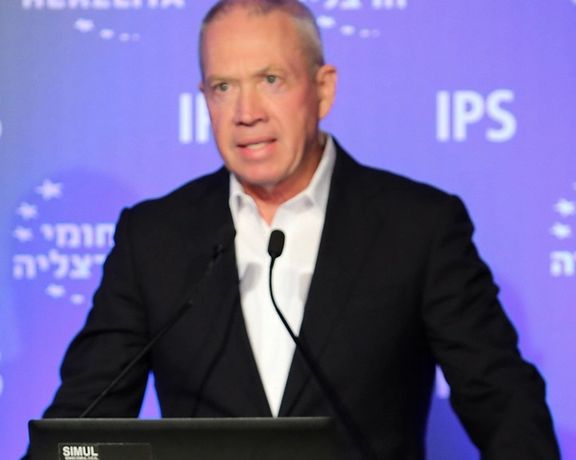
Israel’s Defense Minister vowed tough action in response to a roadside bombing suspected to have been planned by Iran-backed Hezbollah.
On a tour of the border between Israel and Lebanon on Thursday, Yoav Gallant said whoever carried out the attack “will regret” its actions. “We will find the right timing and appropriate manner to hit back,” he said.
An explosive device was detonated next to the Megiddo Junction on Monday, severely injuring an Israeli civilian. Soon after, following an extensive search and road blockades, the suspect was found and killed by Israel’s Yamam forces.
“The terrorist was found in possession of weapons, including an explosive belt ready to be activated and additional means. The assumption is that due to the neutralization, an additional terror attack was prevented,” the IDF spokesman’s office announced this week.
The spokesman’s unit said an initial inquiry suggests that the terrorist is presumed to have crossed into Israel from southern Lebanon, a Hezbollah stronghold, earlier this week.“The possibility of the involvement of the Hezbollah terrorist army is also under review,” it added.
According to Reuters, Hezbollah — Iran’s most powerful proxy which has frequently called for the end of the State of Israel — declined to comment on the allegations.
Israel and Lebanon do not have diplomatic relations and have relied on UN peacekeeping troops, The United Nations Interim Force in Lebanon, to act as a buffer between the two nations since 1978.
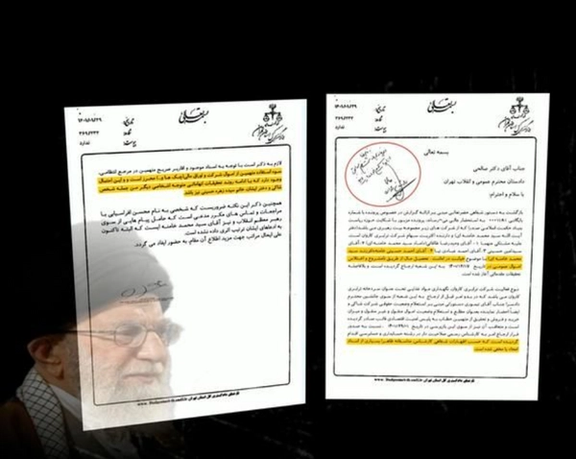
Hacktivist group Edalat-e Ali (Ali's Justice) has released documents revealing an embezzlement case related to a company managed by Iranian Supreme Leader’s brother.
According to the document, Tehran's public and revolutionary prosecutor Ali Salehi has ordered the case not to be pursued after Ali Khamenei’s office pulled some strings.
The complaint was originally filed about a year ago apparently by the office of the president of Sadra Islamic Philosophy Foundation, run by Mohammad Khamenei, one of the brothers of Iran’s ruler, against one of its affiliate companies, a food transportation company called Caravan Transportation.
It is not clear why an institute financed by the government for research on Islamic philosophy owns a food transportation company, nor is it clear why the family business was thrown into shambles.
Four senior members of the transportation company, including Mohammad Khamenei’s own son Ahmad Hosseini Khamenei and son-in-law Vahidreza Taleghani, are among those who were to be prosecuted for acquisition of property through illegal means, according to the leaked document. However, the case was buried upon an order by Salehi, seemingly because more people, including the plaintiff, Mohammad Khamenei, and his daughter Zohreh Hosseini could have been implicated in the case.
The writer of the letter said that abuse of public property and bank cheques were proven and confessed in the case, but Salehi prevented the necessary follow-up. It was also revealed that a man, identified as Mohsen Afrasiabi, had tried to contact the prosecutor’s office, claiming that he had messages from the Supreme Leader himself and his brother Mohammad.
Political analyst Ali-Hossein Ghazizadeh told Iran International that the case is only a small example of the corruption by the family of the Supreme Leader, who is considered “sacred” by his zealous followers.
Late last year, the former chief of Iran's state television, who used to be a regime insider before his row with the IRGC’s intelligence organizations and Khamenei’s son, revealed harrowing facts about systematic corruption in the Iranian government.
Mohammad Sarafraz, who resigned his post as head of IRIB (Islamic Republic of Iran Broadcasting) in May 2016 due to interventions in his organization's financial operations by Khamenei's son Mojtaba and former IRGC intelligence Chief Hossein Taeb, was one of the closest persons to Khamenei until then. The Supreme Leader later appointed Sarafraz as a member of the Supreme Council of Cyberspace. But Sarafraz says he resigned this post also, although Khamenei never accepted his resignation.
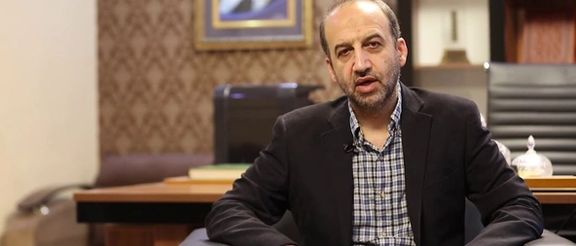
In an interview conducted by one of his former aides and published on You Tube, Sarafraz said that Iranian intelligence officers can even tell judges at the court what they should decide when ruling on various cases.
Sarafraz accused the government and the banking system of systematic corruption that has led to vast income gaps among Iranians. He said most of this corruption exists in companies that enjoy the benefits of private firms but are in fact controlled by the government when they are paying taxes or reporting their financial status. These companies, he said, leave no room for competition from real private businesses.
Eighty percent of Iran’s economy is directly or indirectly controlled by the government or semi-official companies. A privatization drive that began 15 years ago mainly turned into setting up quasi-governmental firms controlled by powerful insiders who block competition and use public funds to stay afloat.

Iran’s foreign ministry spokesman Nasser Kanaani claimed Thursday that IRGC’s Qassem Soleimani was the architect of restoring ties with Saudi Arabia.
Posting a tweet, Kanaani did not explain Soleimani’s role in an agreement last week to restore diplomatic relations between Tehran and Riyadh. Soleimani was killed more than three years ago in an air strike in Baghdad, ordered by former US President Donald Trump.
“General Soleimani not only was a hero in fighting terrorism and enhancing security in the region, he was also a general and an architect of peace, reconciliation and brotherhood among Muslim nations and countries,” Kanaani wrote in his tweet.
One day after the Tehran-Riyadh agreement was announced in Beijing on March 10, some media controlled by Iranian hardliners began saying that that the deal was the result of Iran’s military power in the region, implying that Saudi Arabia had no choice but to mend fences with the Islamic Republic.
Kanaani's tweet can be interpreted as a reference to Soleimani's military role in destabilizing the region.
As commander of IRGC's extraterritorial Quds Force, Soleimani was in fact Tehran’s military and intelligence operative in the Middle East and the architect of creating militant proxy forces in Iraq, Yemen, Syria, Afghanistan and reinforcing the Lebanese Hezbollah.
A devastating missile and drone attack on Saudi oil installations in September 2019 was ascribed to Iran or its Yemeni allies, the Houthis. It was said at the time that Soleimani was one of the main architects of the attack that eluded Saudi and American radars and air defenses.